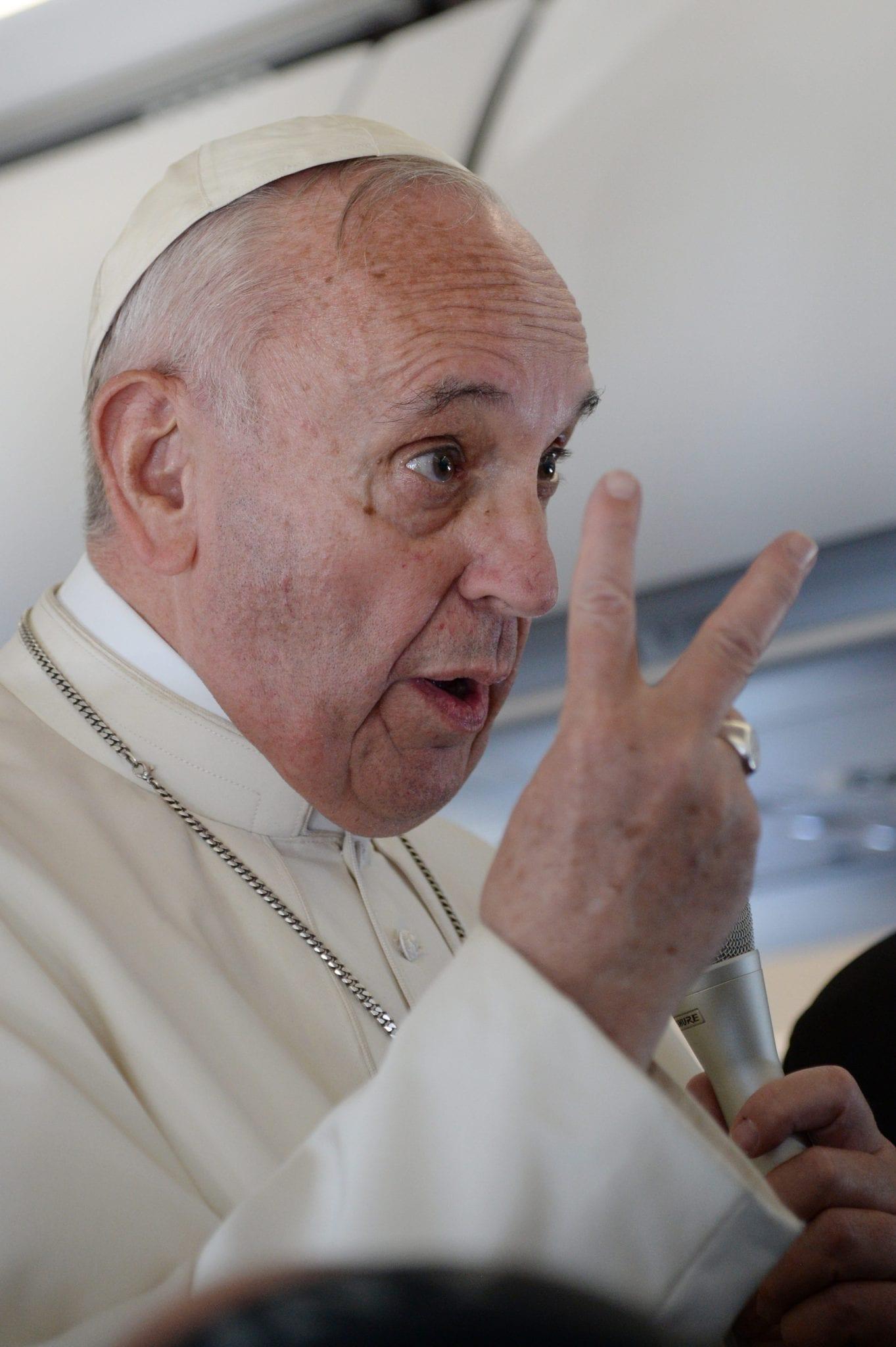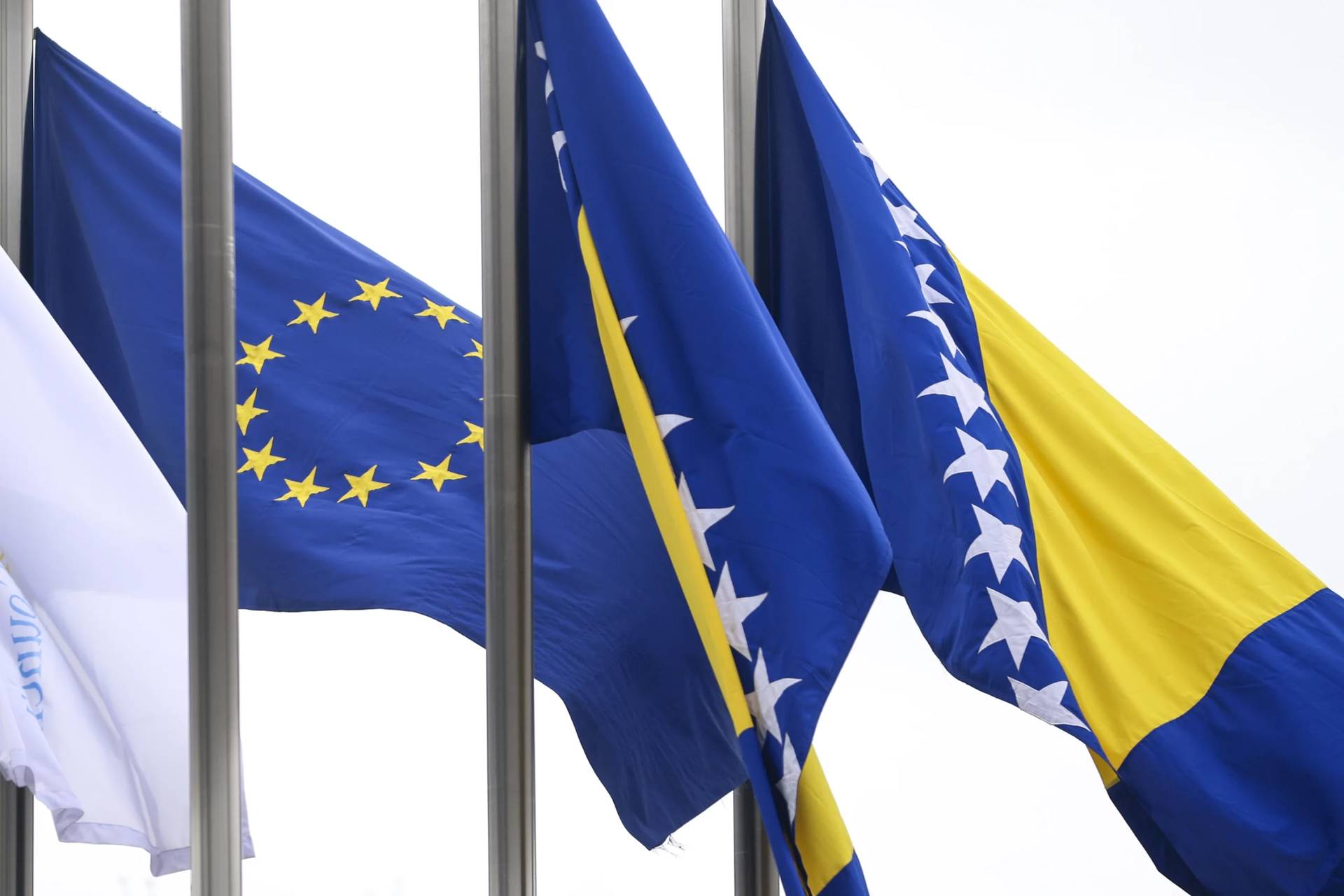ABOARD THE PAPAL PLANE — Bristling at impressions that his brief greeting of Democratic presidential candidate Bernie Sanders on Saturday ahead of a trip to Greece was a political statement, Pope Francis called it merely “common courtesy”, and said anyone who sees it differently needs “a psychiatrist.”
The pontiff also said that his recent document on marriage and the family, Amoris Laetitia, did indeed change the situation in the Church for divorced and civilly remarried Catholics, but avoided offering any details.
He also explained his decision to bring three refugee families on the plane with him from his trip Saturday to the Greek island of Lesbos back to Rome, describing it not as a political gesture but a “completely humanitarian” one.
The pope spoke in a brief exchange with reporters en route from the Greek island of Lesbos to Rome.
Bernie Sanders
On the Vermont senator, Francis said he greeted Sanders on Saturday morning as he was leaving the Santa Marta, the hotel within Vatican grounds where the pope lives.
Sanders was staying at the same residence, because that’s where all participants in the Vatican conference he attended on Friday were spending the night. The only exceptions were Presidents Evo Morales of Bolivia and Rafael Correa of Ecuador, who stayed at their country’s embassy in Rome.
“This morning as I was leaving, Senator Sanders was there,” Francis said. “He knew I was coming out at that time, and he had the kindness to greet me.”
“When I came down, he introduced himself, I greeted him with a handshake, and nothing more,” the pope added. “It’s common courtesy, this is called common courtesy.
“If someone thinks that greeting someone is getting involved in politics,” he said, “I recommend that they find a psychiatrist.”
Refugees
Speaking about the three migrant families flying with him, the pope said this wasn’t “political speculation” but a “purely humanitarian” gesture. He also said it was suggested by one of his collaborators, to which he readily agreed.
Francis then said that everything was done according to the law, and that the 12 people, all of them Muslim refugees fleeing Syria, had the necessary legal papers from Vatican City, Greece and Italy.
“They are [being] welcomed by the Vatican, with the collaboration of the Sant’Egido community,” the pope said. “The Vatican will be the one in charge of helping them find a job and covering their living expenses.”
The three families are in addition to two already living in Rome under the protection of the Vatican.
Of the 12 people who flew with the pope, six of them are children, ranging from 2 to 17 years old.
Speaking about the impact of this “small gesture,” Francis said he’d steal Mother Teresa’s words when she said that what she did was nothing but “a drop of water in the ocean, but without that drop it wouldn’t be the same sea.”
“I answer like this, it’s a small gesture, but a small gesture every man, every woman should do to help those in need,” he said.
Amoris Laetitia
Two of the nine questions Francis answered in 30 minutes were about his apostolic exhortation on the family, Amoris Laetitia. One journalist asked the pope point-blank if the document changed anything for divorced and remarried couples, who currently can’t receive Communion.
The pope said “Yes, and that’s it.”
“I could leave it there, but this would be a simplistic answer. What I ask you is to read the presentation of the document made by Cardinal [Christoph] Schonborn.”
A second journalist asked Francis about footnote 351 of the document, which, for many, is where Francis actually opened the door for divorced and remarried Catholics to access Communion, asking why the pontiff put such an important point in a footnote.
“When I called for the first synod, most in the media were worried about this issue, and I, who am not a saint, got frustrated and then sad,” he said. “Why is it that the media who focus on this don’t see that this is not the big issue?”
He listed what he believes those real issues are.
“Why is it that they don’t see that the family, around the world, is in crisis?” he said. “That despite the family being the foundation of society, the youth today doesn’t want to get married? That the birth rates in Europe make you want to cry?”
Aim of Greece trip
The whole scope of the pope’s five-hour trip to Greece, as he put it on Twitter, was to put faces on statistics that show over one million people have arrived in Europe by sea over the past year, risking their lives, fleeing war, persecution and starvation.
The 12 refugees joining him certainly reflect that drive, but in an attempt to protect their identities, they weren’t allowed to talk to the more than 50 journalists with the pope. Instead, Francis showed several drawings he’d received from children at the Moira refugee camp he’d visited earlier.
One of them depicted people drowning at sea: “Children have these things in their minds and it will take time before these memories go away,” he said.
Showing one in which the sun was crying, Francis said, “If the sun is able to cry, so can we. A tear will do us good.”


















